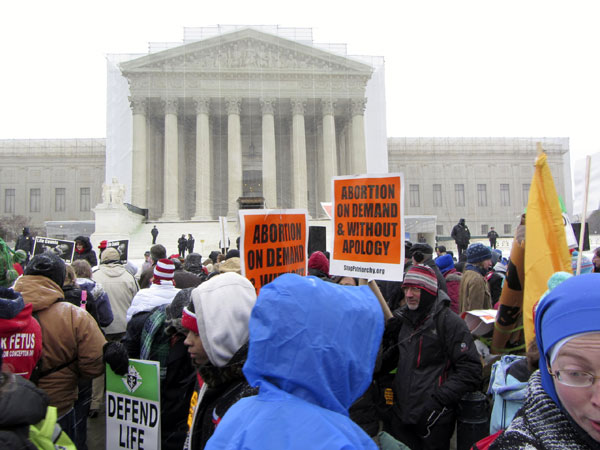- La Feria Community Holds Succesful Business Mixer Event
- Little Nashville to Take Place in Downtown Mercedes
- Lions Basketball Captures District Gold
- La Feria ISD Students Compete in Regional Chess Tournament
- Lions End First Half of 32-4A on a High Note
- La Feria ISD Held Another Successful Parent Conference
- Strong Appearance for Lions at Hidalgo Power Meet
- LFECHS Students Get to Meet Local Actress
- Students Participate in Marine Biology Camp
- Two LFECHS Students Qualify for All-State Band
Texans Watch Closely as Supreme Court Considers Abortion Law
- Updated: March 18, 2016
by Mark Richardson
AUSTIN, Texas – Pro-choice and anti-abortion groups listened carefully Wednesday as the U.S. Supreme Court heard oral arguments on the Texas abortion law, House Bill 2 passed in 2013.
The law forces abortion clinics to meet higher standards, requiring doctors to gain admitting privileges at local hospitals.
Lucy Stein, director of Advocacy for Progress Texas, says Justice Anthony Kennedy may be the difference in the court’s ruling.
“Kennedy is definitely, as anticipated, the swing decision, and we’ll just have to wait and see,” she says. “I don’t think his line of questioning was necessarily dispositive of which way he’s going to lean on this case.”

Pro-choice and anti-abortion advocates gathered in front of the U.S. Supreme Court Wednesday as the justices heard oral arguments on a law that restricts abortions in Texas. Photo: TNS
Stein says Kennedy wanted to see more evidence regarding how the law was forcing the clinics to close, and said perhaps the case should go back to a lower court for more evidence.
The court is split between four conservative justices, including Kennedy, and four liberal justices. Justice Antonin Scalia’s death took a fifth vote from the conservative bloc.
The measure’s backers say the bill protects the health of women seeking abortions, but pro-choice groups say it has forced three out of four abortion clinics in Texas to close. Stein says a 4-4 vote could sustain the lower court’s ruling and allow the restrictive law to go into effect.
“We are cautiously optimistic,” says Stein. “I mean, we have all this evidence on our side and we know what we’re seeing on the ground here in Texas, that women are waiting longer, even in areas that have clinics. Like Dallas – waiting times are up to 20 days to access care, which is definitely a result of these medically unnecessary laws.”
A decision in the case will likely be released sometime over the summer.


